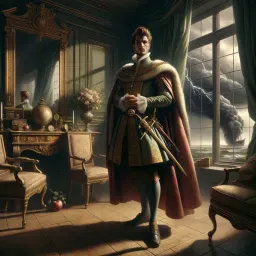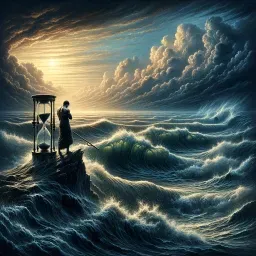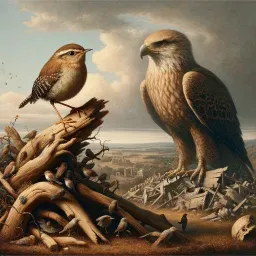I am constant as the northern star

0
0
0
0
- Meaning
- The phrase means that the speaker considers themselves to be steadfast, reliable, and unchanging, much like the North Star, which appears fixed in the sky and serves as a constant point of reference for navigators. In the context of the play, Julius Caesar uses it to highlight his belief in his own immutability and decisiveness.
- Allegory
- In this allegorical image, the majestic ancient ruler represents Julius Caesar and his assertion of constancy. His gaze towards the North Star symbolizes his unyielding determination and steadfastness. The North Star itself serves as a metaphor for guidance and reliability. The stars in the sky reflect the many possibilities and challenges that one can face, while the endless horizon symbolizes the balance between stability and the potential for new explorations. The ship navigating towards the North Star further emphasizes the theme of using constancy as a guiding principle. Altogether, these elements capture the essence of the phrase, representing firm resolve and the importance of being a reliable beacon for oneself and others.
- Applicability
- The teaching from this phrase can be applied to personal life by embracing qualities of reliability and resolve. Just as the North Star provides guidance, being constant in one's principles and actions can offer stability and direction to oneself and others. It encourages maintaining a steady course even when faced with challenges or changing circumstances.
- Impact
- This phrase has had a significant cultural impact, symbolizing steadfastness and reliability. It is often cited in literature, speeches, and conversations to represent unwavering determination. The imagery of the North Star as a symbol of guidance and constancy has permeated various aspects of culture and education.
- Historical Context
- The historical context is the time of Julius Caesar's rule in Rome, but the phrase was written during the Elizabethan era (late 16th to early 17th century) by William Shakespeare. The Elizabethan era, known for its flourishing arts and literature, was also a time of exploration and expansion, making the imagery of the North Star particularly resonant.
- Criticisms
- One criticism could be that it reflects a sense of arrogance and inflexibility. In the context of the play, Caesar's declaration of constancy ultimately precedes his downfall, suggesting that unyielding resolve without consideration of circumstances can be a flaw. This criticism is rooted in the broader theme of hubris in literature and history.
- Variations
- There are no widely recognized variations of the phrase itself, but interpretations change across different cultures. In Western literary context, constancy is often celebrated, while in some Eastern philosophies, adaptability and balance are equally valued.
-

The empty vessel makes the loudest sound.
-

What light through yonder window breaks?
-

Love is not love which alters when it alteration finds, or bends with the remover to remove.
-

Magna res est sapientia.
-

I must be cruel only to be kind; thus bad begins, and worse remains behind.
-

Rich gifts wax poor when givers prove unkind.
-

Some Cupid kills with arrows, some with traps.
-

There is a tide in the affairs of men, which, taken at the flood, leads on to fortune.
-

Come what come may, time and the hour runs through the roughest day.
-

Men at some time are masters of their fates.
-

With mirth and laughter let old wrinkles come.
-

The world is grown so bad, that wrens make prey where eagles dare not perch.
No Comments